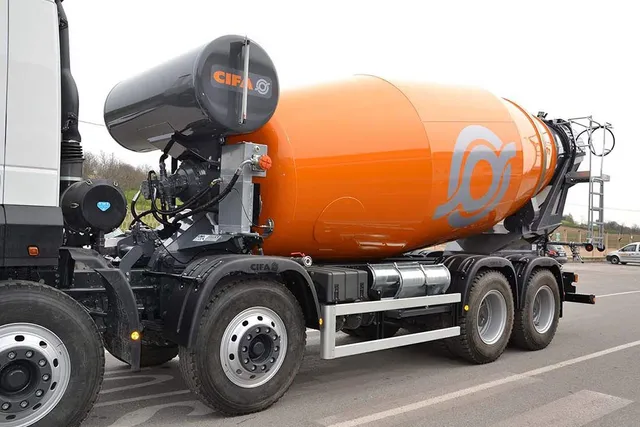Discover how concrete mixers work, the types available, and their key features for efficient mixing and transportation.
Discover how concrete mixers work, the types available, and their key features for efficient mixing and transportation.
Concrete mixers are essential tools in construction, used to blend various ingredients to create concrete. Whether for large-scale commercial projects or small residential repairs, these machines ensure that the concrete is mixed uniformly and efficiently. In this article, we'll delve into what concrete mixers are, their different types, and how they function. We’ll also highlight some specific models, including the CIFA HD Series Concrete Mixer Truck.
What is a Concrete Mixer?
A concrete mixer is a mechanical device that combines concrete ingredients—typically cement, water, sand, and aggregates—into a homogeneous mixture. This mixture is essential for producing concrete that meets the desired strength, consistency, and workability for construction purposes. The primary function of a concrete mixer is to ensure that all components are evenly distributed throughout the mixture, resulting in a uniform consistency.
Types of Concrete Mixers
Concrete mixers come in various types, each suited to different construction needs and scales of operation. Here’s a rundown of the most common types:
1. Drum Mixers
Drum mixers are the most widely recognized type of concrete mixer. They feature a rotating drum that blends the concrete ingredients. Drum mixers can be further categorized into:
- Batch Mixers: These mixers prepare concrete in batches. The drum rotates to mix the ingredients thoroughly, and the finished concrete is discharged when the drum is tilted. This type is ideal for projects requiring different concrete mixes.
- Continuous Mixers: Unlike batch mixers, continuous mixers operate without stopping. Ingredients are fed into the drum continuously, and the concrete is discharged at a consistent rate. This type is suitable for large-scale projects where a steady supply of concrete is needed.
2. Pan Mixers
Pan mixers feature a horizontal pan in which the mixing occurs. The mixing blades or paddles rotate within the pan to blend the ingredients. Pan mixers are often used for producing high-quality concrete and are suitable for smaller batches or specialized mixes.
3. Twin-Shaft Mixers
Twin-shaft mixers have two rotating shafts with blades that mix the concrete ingredients. This type provides a high mixing efficiency and is often used in large-scale projects where uniformity and consistency are crucial.
4. Concrete Mixer Trucks
Concrete mixer trucks, also known as ready-mix trucks, are equipped with a rotating drum mounted on the truck chassis. These mixers transport and mix concrete at the construction site, ensuring it remains workable until it's needed. An example of a concrete mixer truck is the CIFA HD Series Concrete Mixer Truck, which combines durability and advanced features to deliver high-performance mixing and transportation.
How Concrete Mixers Work
Concrete mixers work by rotating a drum or pan to blend the concrete ingredients. The process involves several key steps:
- Loading Ingredients: The first step is loading the ingredients into the mixer. This typically includes cement, water, sand, and aggregates. The proportions of these materials are crucial for achieving the desired concrete mix.
- Mixing Process: Once the ingredients are loaded, the mixer starts rotating. The rotation of the drum or pan ensures that the materials are thoroughly combined. The mixing action is designed to ensure that the cement coats all the aggregates, resulting in a uniform mixture.
- Discharging Concrete: After the mixing process is complete, the concrete is discharged from the mixer. In drum mixers, this is achieved by tilting the drum, while in pan mixers, the concrete is often discharged through a discharge chute.
- Cleaning: After the concrete is discharged, the mixer needs to be cleaned to prevent residue buildup. This involves rinsing the drum or pan with water and, in some cases, using a cleaning agent.
Advantages of Concrete Mixers
Concrete mixers offer several benefits, including:
- Consistency: They ensure a consistent mix, which is essential for the quality and strength of the concrete.
- Efficiency: Mixing concrete in a machine is faster and more efficient than manual mixing.
- Scalability: Mixers are available in various sizes, making them suitable for projects of all scales.
- Reduced Labor: Using a mixer reduces the manual labor required for mixing concrete.
Applications of Concrete Mixers
Concrete mixers are used in a wide range of applications, including:
- Construction Projects: They are essential for constructing buildings, bridges, roads, and other infrastructure.
- Residential Repairs: Mixers are used for small-scale projects like driveways, patios, and foundations.
- Industrial Use: In factories, mixers are used to produce precast concrete elements.
Key Features to Consider
When choosing a concrete mixer, consider the following features:
- Capacity: Depending on the scale of the project, you'll need a mixer with an appropriate capacity. For large projects, a mixer truck like the CIFA HD Series Concrete Mixer Truck might be ideal.
- Mixing Efficiency: Look for mixers with efficient mixing mechanisms to ensure a uniform mix.
- Durability: Ensure the mixer is built to withstand the rigors of construction environments.
- Ease of Use: Consider features that make the mixer easier to operate and maintain.
Conclusion
Concrete mixers are indispensable tools in the construction industry, ensuring that concrete is mixed uniformly and efficiently. Whether you’re working on a large commercial project or a small residential repair, understanding the different types and features of concrete mixers can help you choose the right equipment for your needs. For example, the CIFA HD Series Concrete Mixer Truck offers advanced features and reliable performance for transporting and mixing concrete on-site.
By choosing the right concrete mixer and understanding how it works, you can ensure that your construction projects are completed with high-quality, durable concrete.

Read More: https://almarwan.com/p/AMH186/cifa-hd-series-concrete-mixer-truck.html



No comments:
Post a Comment